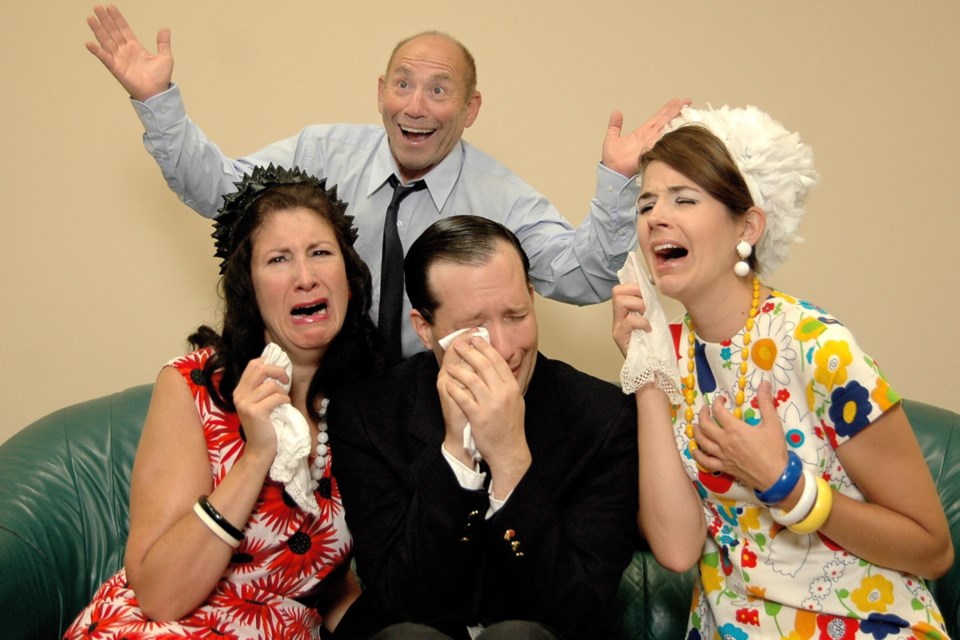What: The Odd Couple
Where: Metro Studio
When: To Oct. 6
Rating: Three stars (out of five)
Felix Unger and Oscar Madison are among contemporary theatre’s best-known archetypes. Thanks to the play, the film and the TV series, we all know about Felix the neurotic neat-freak and Oscar the semi-lovable slob.
Neil Simon’s 1965 comedy is still staged regularly throughout North America. In Victoria, it’s been revived by a local troupe directed by Richard Stille.
The question is, does The Odd Couple stand the test of time? Yes and no.
The actors locomoting this trusty ol’ engine are Eric Holmgren, playing Felix, and Howie Siegel as Oscar. They take us down a familiar trek: Felix’s wife kicks him out of the house and demands a divorce. Distraught, he ends up at the apartment of Oscar, who invites his pal to stay indefinitely. Of course, Felix’s obsessive neatness, hypochronia and habit of clearing his sinuses with high-decibel goose-honks wears thin with Oscar, who also kicks Felix out.
Everything doesn’t exactly wrap up with a neat bow. At the end, Oscar (who in Simon’s play is much more selfish than in 1970s TV sitcom) does seem to mature a soupçon or two. Felix, still the same person, merely moves on to a new set of roomies.
The yin and yang synergy between Felix and Oscar determines whether The Odd Couple works. On Wednesday night, Holmgren and Siegel didn’t achieve the onstage chemistry one hopes for.
Holmgren, a good actor, makes Felix the overwrought basket case we’ve come to expect. There was a welcome physicality to his performance. One of the best scenes was when a tuxedoed Felix, attempting to avoid the advances of the Pigeon sisters, practically pops out of his skin in fits of nervous freneticism.
Siegel captured Oscar’s gruffness; however his stiff, jerky delivery (phrases were often delivered in staccato bursts) was removed from the way people really speak. And he seemed to have difficulty connecting to other actors, at times seeming to avoid eye contact.
There were good moments; the audience did laugh and applaud. Yet, on this particular evening, the quick and seemingly effortless banter that marks the best comedy (think of expert badminton players batting a shuttlecock) never really transpired.
Before Felix makes his entrance, the play opens with a surprisingly long poker game that lasts half a hour. This quintessentially male ritual is a nicely written sequence. Notable in this beer-and-chips bunch was Jaymes D. Goodman who, in clever turn, made henpecked Vinnie funny and vulnerable.
Fellow poker player Wes Borg was also impressive. His character, Speed, is one of those temper-driven Jackie Gleason types. The temptation is to create a stereotype, but Borg — peppery and contained — managed to make Speed a real person. A talented, thoughtful actor who’s developed in recent years, Borg is more than ready for leading roles on Victoria stages.
Karen Breisford and Kirsten Van Ritzen, wearing outrageous 1960s dresses as the Pigeon sisters, provided welcome comic relief.
Director Stille, emphasizing the physical, makes sure the cast is lively on stage. The acting is on the broad side, giving the show a certain energy and entertainment value. Yet at times, some of the more subtle elements within the script are blunted by this approach.
Does The Odd Couple resonate as well for today’s audiences as it did almost half a century ago? Certainly times have changed. The hint of scandal that tinctured divorce (Oscar is also a recent divorcee) in 1965 has all but disappeared. The play is not as edgy as it was.
The Odd Couple’s central comedic premise — that two men living together in a man-and-wife style arrangement is intrinsically funny — carries less weight now. Today, divisions between what men and women do on the domestic front are blurred. And so Felix’s interest in doing what in 1965 was regarded as “women’s work” seems less absurd … and less amusing.
